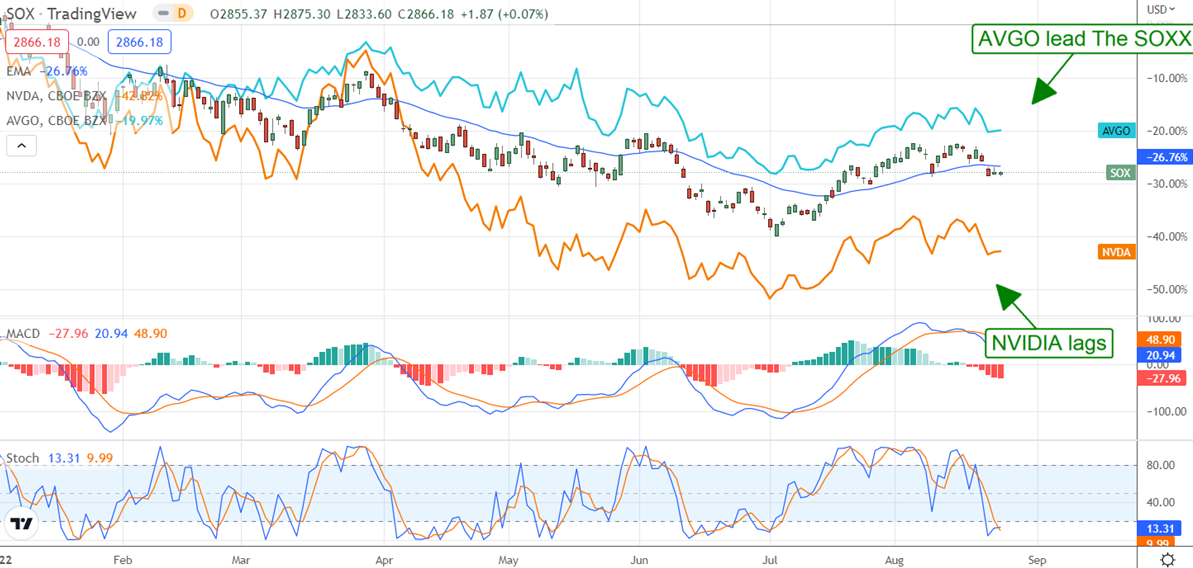NVIDIA (NASDAQ:NVDA) 2nd quarter results reveal a growing bifurcation within the microchip industry. On the one hand, data center demand is supporting growth, while on the other, weaknesses in PCs and gaming are sapping the company’s strength. In this light, NVIDIA’s future revenue and earnings may trend flat or even decline while the gaming and PC industry undergo what company management calls an inventory correction.
OEMs are letting overstocked inventories of NVIDIA (NASDAQ:NVDA) chips dwindle to realign those inventories with consumer demand and prepare for NVIDIA’s next generation of products. The takeaway for investors is that NVIDIA will likely lag the semiconductor market for the remainder of the year, along with PC-centric names like Intel (NASDAQ:INTC).
At the same time, those with a more focused exposure to the data center and cloud-based demand like Broadcom (NASDAQ:AVGO) should outperform. Regarding NVIDIA’s next generation of microprocessors, the GE Force RTX 40 series is rumored to be incredibly powerful and is expected to launch in October of this year. Still, it may be another quarter or two before the launch has an appreciable impact on the results.
NVIDIA Has Weak Quarter, Lowers Guidance
NVIDIA had a weak quarter and was made weaker by the fact that the company warned on revenue and profit just a month before the release. In this light, the $6.7 billion in revenue is as expected and produced 2.9% YOY growth.
Still well below the previous outlook, the company posted a double-digit sequential decline, and the guidance for the next quarter was cut drastically. On a segment basis, the company says data center demand increased by 61% over last year but was offset by weak PC and gaming sales. The gaming category sales were impacted by the decline in the cryptocurrency market as well, but the company was unable to quantify the impact at this time.
Moving on to the margin and earnings, the news gets even worse. The combination of rising costs and deleveraging related to the sales slowdown trimmed more than 2000 basis points off of the GAAP and adjusted gross margin.
This led to a significant decline in the operating margin that led to a greater than 70% decline in GAAP and adjusted operating margin. On the bottom line, the $0.51 in adjusted earnings is a penny better than expected, which is the best news of the report, but the slowdown in business has yet to bottom.
Turning to the guidance, the company lowered its guidance for Q3 revenue to $5.90 billion compared to the Marketbeat.com consensus of $6.92 billion, a difference of 1450 basis points and there is a downside risk in the outlook.
NVIDIA Increases Capital Returns
NVIDIA has a solid balance sheet and ample FCF to return capital to shareholders. The dividend is a paltry 0.10% compared to at least 2.0% for many of the dividend-paying chip stocks and better than 3.0% paid out by Broadcom.
Broadcom is also a dividend-growth stock with attractive metrics in that regard and it should provide a more favorable outlook when it reports in the first week of September. NVIDIA also repurchased shares and bought back $2.04 billion during the quarter. That’s worth another 0.5% to investors, not counting the $11.93 billion still left under the current repurchase authorization.
Turning to the chart, shares of NVDA are down nearly 4% in premarket action as the stock continues to underperform relative to the semiconductor index in 2022. However, Shares of Broadcom are edging higher on the NVIDIA news and outperforming the industry by a fair margin.

Which stock should you buy in your very next trade?
With valuations skyrocketing in 2024, many investors are uneasy putting more money into stocks. Unsure where to invest next? Get access to our proven portfolios and discover high-potential opportunities.
In 2024 alone, ProPicks AI identified 2 stocks that surged over 150%, 4 additional stocks that leaped over 30%, and 3 more that climbed over 25%. That's an impressive track record.
With portfolios tailored for Dow stocks, S&P stocks, Tech stocks, and Mid Cap stocks, you can explore various wealth-building strategies.
